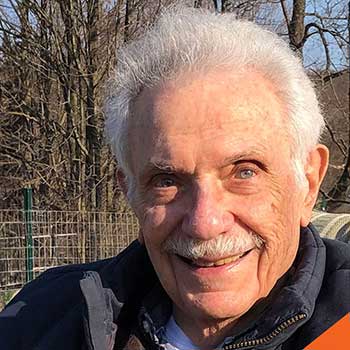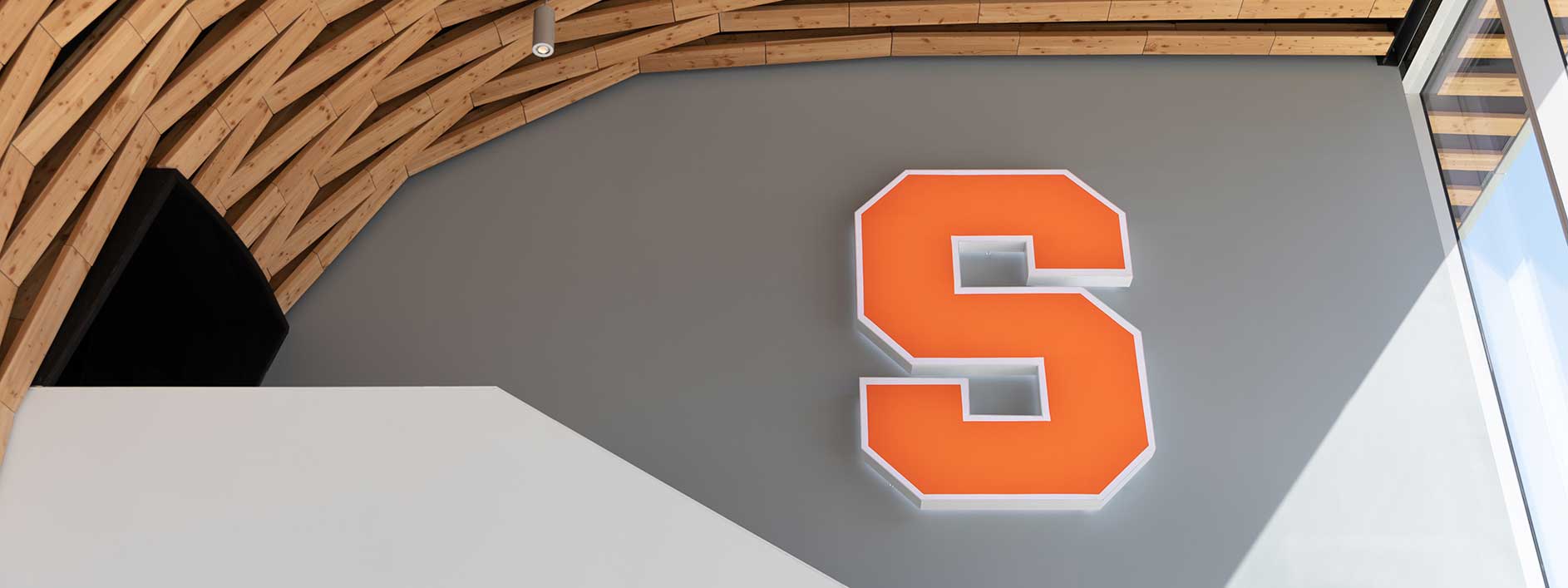 “Syracuse Physics was and still is a vast entryway to the future.” Words penned by alumnus and philanthropist Jay N. Zemel when he was in his 90s and reflecting on his experiences at Syracuse University. He earned a B.S. in 1949, a master’s in 1952 and a Ph.D. in 1956. Such was his love for his alma mater that Zemel made the University the beneficiary of a $1.5 million estate gift in an endowed fund as part of the Forever Orange Campaign to support summer undergraduate research experiences for students studying physics.
“Syracuse Physics was and still is a vast entryway to the future.” Words penned by alumnus and philanthropist Jay N. Zemel when he was in his 90s and reflecting on his experiences at Syracuse University. He earned a B.S. in 1949, a master’s in 1952 and a Ph.D. in 1956. Such was his love for his alma mater that Zemel made the University the beneficiary of a $1.5 million estate gift in an endowed fund as part of the Forever Orange Campaign to support summer undergraduate research experiences for students studying physics.
Zemel took what he learned at Syracuse University and launched a career in research and teaching—much of it at the University of Pennsylvania—that brought him national renown, 26 patents, 120 journal articles and book chapters, and the endless praise of mentees, colleagues and admirers along the way. After his death at the age of 95 on July 20, 2023, one of his former graduate students Carlos Lopez Reyna wrote to his daughter Babette: “He gave me the gift of knowledge, experience and a listening ear when needed.”
Zemel was passionate about teaching and personally guiding young researchers because he knew firsthand how vital it was to one’s future. He described his undergraduate years as difficult because he suffered from dyscalculia, which limited his ability to do simple math—though he was a math major and had no problem with logic, complex variables and quantum mechanics. Zemel’s professor in geometric optics, William R. Fredrickson (who is named and honored in the gifted endowment), recognized his potential despite the challenges.
“It was Fredrickson’s decision to grant me a teaching assistantship in his remarkable course on the history of science and his approving my entrance to graduate school that I have never forgotten,” Zemel shared in an interview with the College of Arts and Sciences. “Indeed, that course on history has been one of my key intellectual enlightenments, as well as giving me the insight into teaching that should accompany highly technical courses.”
“As a distinguished researcher and committed educator, Dr. Zemel saw the immense value of undergraduate participation in faculty-guided scholarly research,” says Behzad Mortazavi, dean of the College of Arts and Sciences. “The benefits of undergraduate research are numerous, including helping students to apply their classroom knowledge and giving them valuable experience in working as part of a team.” The Zemel Undergraduate Research Experience Endowed Fund will provide research stipends for students who are interested in pursuing research as a career, especially multidisciplinary research.
‘Learning by Doing’
Zemel had a distinctive approach, blending teaching and research to create a “unique learning environment,” according to colleague and former mentee Jan Van der Spiegel, professor of electrical and systems engineering at Penn. “At the undergraduate level, his teaching philosophy centered around the principle of ‘learning by doing and making mistakes.’ Rather than dictating precise instructions, he encouraged students to explore potential solutions independently. While maintaining a hands-off approach, he remained a constant pillar of support, readily available with an open-door policy for students to seek guidance at any time.”
Even when Zemel officially retired from his academic career directing Penn’s Center for Chemical Electronics/Sensor Technologies, he continued to mentor student researchers. “He would get so jazzed when he saw a student putting things together,” recalls Babette. She, like Zemel’s other children and several grandchildren, have become teachers and mentors. “Mentoring is, by far, the most enriching and fulfilling thing that I do,” says Babette. “Young researchers need encouragement, a sympathetic ear, professional connections and guidance on how to secure funding during these challenging times.”
Remembering His Encouragement
The young researchers who worked with Zemel most remember his encouragement, empathy and warmth. “Working for his group was the best thing I could have ever done,” says Ashok Sood, president and CEO at Magnolia Optical Technologies. “He was an amazing professor,” Sood says of his thesis advisor. “I also learned from him to always stay busy, to keep your neurons working!”
Even into his 90s, Zemel challenged his neurons, continuing to analyze scientific data and contribute to meaningful research. He worked with daughter Babette’s colleagues at the Children’s Hospital of Pennsylvania to develop a device called the Neoneur that measures the flow of fluid through a nipple in a baby bottle to characterize infant sucking behavior and help parents and physicians determine if a baby was feeding properly. And just weeks before his death, recalls Babette, he solved the problem of how to manage wrapping his oxygen tubes around his ears, while wearing glasses and hearing aids.
Jennifer L. Ross, chair of physics in the College of Arts and Sciences, says Zemel’s gift is as inspiring as he was. “His passion and generous gift will fuel the physics department’s dream of having all undergraduate physics majors get hands-on research experiences,” says Ross. “The experiential learning opportunities will expose our students to the wonders of the universe and create the scientists who will make amazing discoveries of the future.”
That was clearly Zemel’s intent in setting up the endowment. Recalling that Syracuse physics opened the doors of discovery for him, Zemel wrote in a letter to the physics department: “You and your colleagues are part of a great tradition that I sincerely hope continues now and into the future.” His estate gift ensures that the tradition continues.

